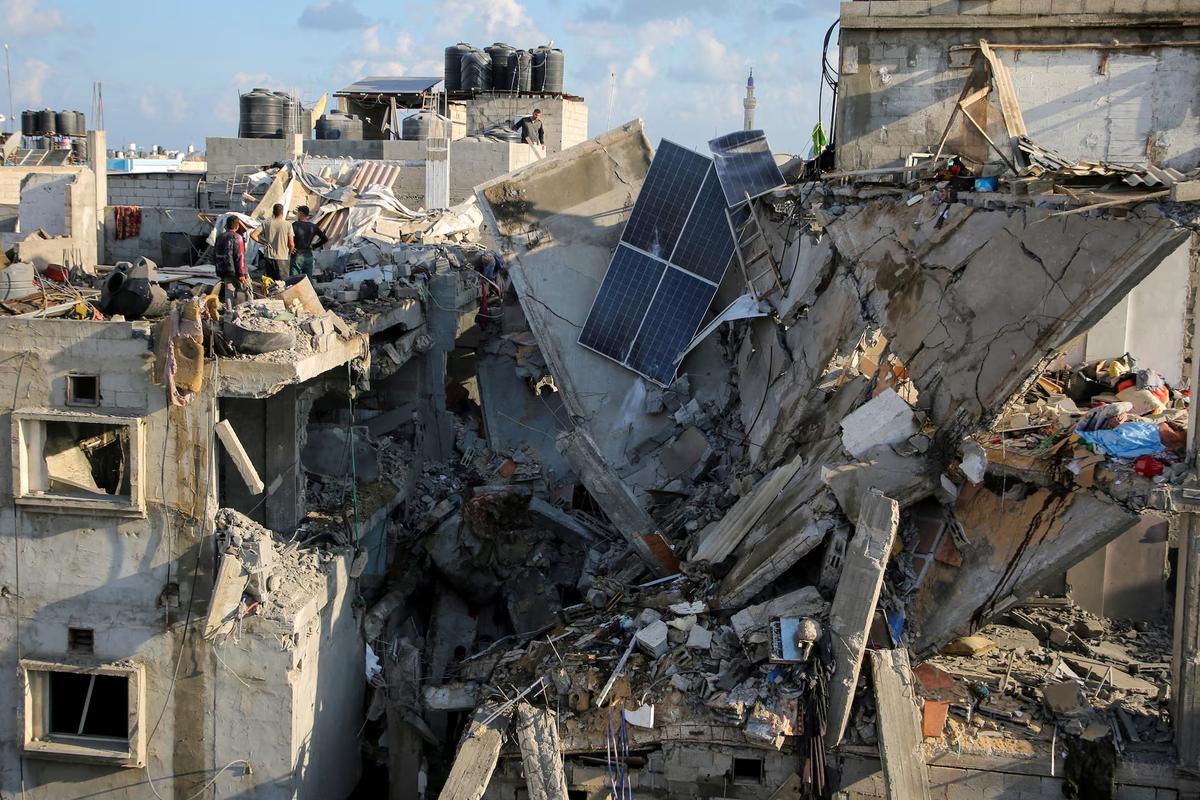[ad_1]

Smoke billows after Israeli bombardment in Rafah in the southern Gaza Strip on Monday, May 6, 2024.
| Photo Credit: AFP
The story so far: Israel advancing with a long-anticipated ground invasion of Rafah and seizing control of the Gaza side of the border crossing with Egypt on Tuesday, shortly after Hamas announced its acceptance of a ceasefire proposal brokered by Egypt and Qatar, has cast a shadow on the prospects of halting the war, which has claimed the lives of over 34,700 people so far.
Israeli tanks moved into the southern part of the city overnight, while warplanes bombed areas near the crucial Rafah border crossing, killing at least 23 Palestinians and injuring several others. The invasion, described by the U.S. as a “limited operation,” unfolded a day after the Israeli military ordered over a million people sheltering in Rafah to evacuate parts of the southern Gaza Strip city and relocate to an “expanded humanitarian zone” near Khan Younis, in preparation for an assault to “eradicate” Hamas.
Explained | How bad is the humanitarian crisis in Gaza?
The military operation in Rafah: what, why and how
Israel ordered the Rafah evacuation after four of its soldiers were killed in a rocket attack claimed by the Hamas armed wing near Rafah on May 5. The evacuation order prompted widespread concern about the potential ramifications for the millions of displaced Palestinians camping there.
The U.S. cautioned PM Benjamin Netanyahu against launching a southern Gaza offensive. Terming the impending invasion as a “red line” for his administration, President Joe Biden said further military action risked more casualties and devastation. Further, in a telephonic conversation with the Israeli PM, the U.S. President again highlighted the necessity of a ceasefire with Hamas to protect Israeli hostages and emphasised it as the best course of action.
Human rights groups and aid agencies also warned that an Israeli incursion could result in dire consequences, potentially leading to a “bloodbath.”
Against the backdrop of an imminent all-out military assault on Rafah, Hamas leader Ismail Haniyeh announced that the group accepted a ceasefire proposal mediated by Qatar and Egypt. Israel must decide whether it accepts or obstructs a truce, a Hamas official said. The ball is now in Israel’s court, the official told AFP.
Israel, meanwhile, remained defiant and insisted on invading Rafah despite international pressure. Tel Aviv said it would “stand alone if it has to.”
Hours after Hamas’ announcement raised hopes of a pause in firing, Mr. Netanyahu rejected the ceasefire agreement as “far from Israel’s necessary demands,” claiming that its terms had been “softened.”

Palestinians inspect the site of an Israeli strike on a house, amid the ongoing conflict between Israel and the Palestinian Islamist group Hamas, in Rafah, in the southern Gaza Strip on May 7, 2024.
In a statement, the Israeli PM said the war Cabinet had unanimously decided to continue its operation in Rafah to “apply military pressure on Hamas,” advance the release of hostages and achieve the “other objectives” of the war. It added that a delegation will be nonetheless sent to meet with mediators in Cairo “to exhaust the possibility” of reaching an agreement on “terms acceptable to Israel.”
On Sunday night, the military alert dropped leaflets and sent messages, ordering people to relocate to an expanded humanitarian zone ‘Muwasi,’ a makeshift tent camp. Notably, the Israeli military had issued similar evacuation orders at the onset of the war in 2023, often directing civilians to vacate combat zones before offensive actions and asking them to move south to Rafah.
Soon after, the Israel Defence Forces (IDF) launched a “precise counterterrorism operation to eliminate Hamas terrorists and infrastructure” in eastern Rafah. Twenty-three people, including six women and five children, were killed in the series of strikes and bombardment across Rafah, Associated Press reported.
In a first since its 2005 disengagement from Gaza, the Israeli military returned to the point and seized control of the Rafah border crossing on the Gaza side. Video clips shared online by the IDF showed Israeli flags flying at the checkpoint and atop tanks. “The IDF will continue pursuing Hamas everywhere in Gaza until all the hostages that they’re holding in captivity are back home,” it posted on X.
The View From India | Why truce remains elusive in Gaza
What is the significance of Rafah for Israel?
The southern city of Rafah has served as a shelter for an estimated 1.4 million Palestinians forced to leave their homes to escape military action after Israel launched a military campaign following Hamas’ October 2023 attacks in Israel in which at least 1,200 people were killed.
The Rafah crossing has been a lifeline for hundreds of thousands of people caught in the conflict. The border point is the main exit point from Gaza, and the sole crossing not directly under Israeli control. It is the centre for delivery of critical aid, food and humanitarian assistance, facilitating the exit of injured people and foreign passport holders from the strife-torn area. The displaced Palestinians and residents, living in densely packed camps and apartments in Rafah, are entirely dependent on international aid for food and basic supplies arriving in Gaza from the Rafah border crossing.
The area emerged as a focal point in the escalating conflict in recent months amid Israel’s claims that the crossing is used for “terrorist purposes.” Israel contended that Rafah is Hamas’ “last bastion” and shelters thousands of fighters and potentially numerous hostages. The administration claimed that four of the militant group’s 24 battalions are based in the area.
Israeli PM Netanyahu repeatedly deemed Rafah crucial to achieve his government’s “central goal” of dismantling the military and governing capabilities of Hamas. “It is impossible to achieve the goal of the war of eliminating Hamas by leaving four Hamas battalions in Rafah,” Mr. Netanyahu said in a statement in February.
A week ago, the Israeli PM vowed to enter Rafah and destroy Hamas’ remaining battalions, regardless of whether a deal was reached or not. “The idea that we will stop the war before achieving all of its goals is out of the question. We will enter Rafah and we will eliminate Hamas’ battalions there — with a deal or without a deal, to achieve total victory,” Mr. Netanyahu later said in a meeting with the families of the hostages.
With Israeli troops taking control of the Rafah crossing on Tuesday, Israel now has full authority over the entry and exit of people and aid. The development has sparked global concern over the fate of Gaza’s 2.3 million people, left hungry and homeless due to the war.
[ad_2]
Source link





